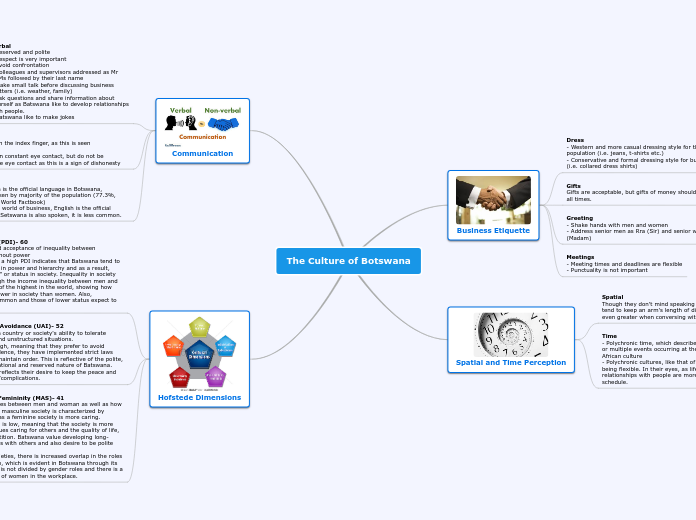The Culture of Botswana
Business Etiquette
Dress
- Western and more casual dressing style for the general population (i.e. jeans, t-shirts etc.)
- Conservative and formal dressing style for business people (i.e. collared dress shirts)
Gifts
Gifts are acceptable, but gifts of money should be avoided at all times.
Greeting
- Shake hands with men and women
- Address senior men as Rra (Sir) and senior women as Mma (Madam)
Meetings
- Meeting times and deadlines are flexible
- Punctuality is not important
Spatial and Time Perception
Spatial
Though they don't mind speaking with someone up close, they tend to keep an arm's length of distance and the distance is even greater when conversing with strangers.
Time
- Polychronic time, which describes the action of multitasking or multiple events occurring at the same time, is valued in African culture
- Polychronic cultures, like that of Botswana, view time as being flexible. In their eyes, as life is not predictable, relationships with people are more important than following a schedule.
Communication
Verbal
- Reserved and polite
- Respect is very important
- Avoid confrontation
- Colleagues and supervisors addressed as Mr
or Ms followed by their last name
- Make small talk before discussing business
matters (i.e. weather, family)
- Ask questions and share information about
yourself as Batswana like to develop relationships
with people.
- Batswana like to make jokes
Non-Verbal
- Don't point with the index finger, as this is seen
as disrespectful\
- Do not maintain constant eye contact, but do not be reluctant to make eye contact as this is a sign of dishonesty
Languages
- Though English is the official language in Botswana, Setswana is spoken by majority of the population (77.3%, according to the World Factbook)
- In terms of the world of business, English is the official language. While Setswana is also spoken, it is less common.
Hofstede Dimensions
Power Distance (PDI)- 60
- the existence and acceptance of inequality between
those with and without power
- Botswana having a high PDI indicates that Batswana tend to accept inequalities in power and hierarchy and as a result, accept their "place" or status in society. Inequality in society can be seen through the income inequality between men and women being one of the highest in the world, showing how men have more power in society than women. Also, centralization is common and those of lower status expect to be told what to do.
Uncertainty Avoidance (UAI)- 52
- it refers to a country or society's ability to tolerate
uncertainty and unstructured situations.
- Relatively high, meaning that they prefer to avoid
uncertainty. Hence, they have implemented strict laws
and rules to maintain order. This is reflective of the polite,
non-confrontational and reserved nature of Batswana.
Their society reflects their desire to keep the peace and
avoid conflict/complications.
Masculinity and Femininity (MAS)- 41
- distribution of roles between men and woman as well as how the values differ. A masculine society is characterized by aggression, whereas a feminine society is more caring.
- MAS of Botswana is low, meaning that the society is more "feminine" and values caring for others and the quality of life, rather than competition. Batswana value developing long-lasting relationships with others and also desire to be polite and respectful.
- in "feminine" societies, there is increased overlap in the roles of men and women, which is evident in Botswana through its workplace. Labour is not divided by gender roles and there is a significant number of women in the workplace.
